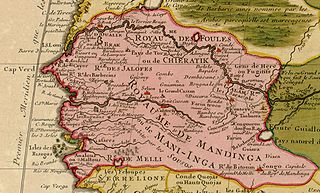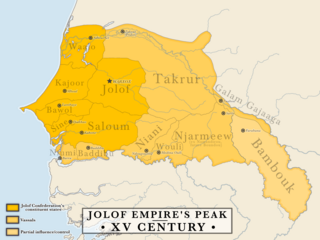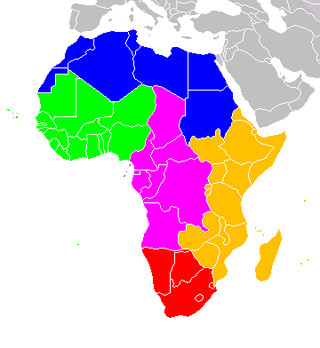
The history of Senegal is commonly divided into a number of periods, encompassing the prehistoric era, the precolonial period, colonialism, and the contemporary era.

The first written records of the region come from Arab traders in the 9th and 10th centuries. In medieval times, the region was dominated by the Trans-Saharan trade and was ruled by the Mali Empire. In the 16th century, the region came to be ruled by the Songhai Empire. The first Europeans to visit the Gambia River were the Portuguese in the 15th century, in 1447, who attempted to settle on the river banks, but no settlement of significant size was established. Descendants of the Portuguese settlers remained until the 18th century. In the late 16th century, English merchants attempted to begin a trade with the Gambia, reporting that it was "a river of secret trade and riches concealed by the Portuguese."

The Gambia River is a major river in West Africa, running 1,120 kilometres (700 mi) from the Fouta Djallon plateau in north Guinea westward through Senegal and The Gambia to the Atlantic Ocean at the city of Banjul. It is navigable for about half that length.

The Jolof Empire, also known as Great Jolof, or the WolofEmpire, was a Wolof state that ruled parts of West Africa situated in modern-day Senegal, Mali, Gambia and Mauritania from around the 12th century to 1549. Following the 1549 battle of Danki, its vassal states were fully or de facto independent; in this period it is known as the Jolof Kingdom.

Kunta Kinteh Island, formerly called James Island and St Andrew's Island, is an island in the Gambia River, 30 km (19 mi) from the river mouth and near Juffureh in the Republic of the Gambia. Fort James is located on the island. It is less than 3.2 km from Albreda on the river's northern bank. As an important historical site in the West African slave trade, it is listed as a UNESCO World Heritage Site, together with related sites including a ruined Portuguese chapel and a colonial warehouse in Albreda, the Maurel Frères Building in Juffureh, and Fort Bullen and Six-Gun Battery, which are located at the mouth of the Gambia River.

Guinea is a traditional name for the region of the coast of West Africa which lies along the Gulf of Guinea. It is a naturally moist tropical forest or savanna that stretches along the coast and borders the Sahel belt in the north.
Alvise Cadamosto (Portuguese pronunciation:[alˈvizɨkɐðaˈmoʃtu]; Italian pronunciation:[alˈvizeˌkadaˈmosto])(c. 1432 – 16 July 1483) was a Venetian explorer and slave trader, who was hired by the Portuguese prince Henry the Navigator and undertook two known journeys to West Africa in 1455 and 1456, accompanied by the Genoese captain Antoniotto Usodimare. Some have credited Cadamosto and his companions with the discovery of the Cape Verde Islands and the points along the Guinea coast from the Gambia River to the Geba River, the greatest leap in the Henrican discoveries since 1446. Cadamosto's accounts of his journeys, including his detailed observations of West African societies, have proven invaluable to historians.

The geography of North Africa has been reasonably well known among Europeans since classical antiquity in Greco-Roman geography. Northwest Africa was known as either Libya or Africa, while Egypt was considered part of Asia.

Ponnani is a municipality in Ponnani Taluk, Malappuram District, in the state of Kerala, India. It serves as the administrative center of the Taluk and Block Panchayat of the same name. It is situated at the estuary of Bharatappuzha, on its southern bank, and is bounded by the Arabian Sea on the west and a series of brackish lagoons in the south.

Diogo Gomes was a Portuguese navigator, explorer and writer. Diogo Gomes was a servant and explorer of Portuguese prince, Henry the Navigator. His memoirs were dictated late in his life to Martin Behaim. They are an invaluable account of the Portuguese discoveries under Prince Henry the Navigator, and one of the principal sources upon which historians of the era have drawn. He explored and ascended up the Gambia River in West Africa and discovered some of the Cape Verde islands.

Portuguese Africans are Portuguese people born or permanently settled in Africa. The largest Portuguese African population lives in Portugal numbering over 1 million with large and important minorities living in South Africa, Namibia and the Portuguese-speaking African countries .The descendants of the Portuguese settlers who were born and "raised" locally since Portuguese colonial time were called crioulos. Much of the original population is unnumbered having been assimilated into Portugal, Brazil, and other countries.
The Kingdom of Orungu was a small, pre-colonial state of what is now Gabon in Central Africa. Through its control of the slave trade in the 18th and 19th centuries, it was able to become the most powerful of the trading centers that developed in Gabon during that period.
The kingdom of Kasa, also known as Kasanga, was the dominant kingdom in lower Casamance during the 15th and 16th centuries. Many of the inhabitants of the realm were Bainuk or other native ethnicities, but it was ruled by a Mandinkized elite. The capital was at Brikama, on the south bank of the Casamance River.
The Niominka people are an ethnic group in Senegal living on the islands of the Saloum River delta. They are currently classified as a subgroup of the Serer.
Sutukoba, sometimes referred to as Sutuko, is a village in The Gambia located in the Upper River Region, 332 km east of the capital Banjul and 38 km northeast of the regional capital Basse Santa Su. The population in 2013 was 3317.

Gambian nationality law is regulated by the Constitution of The Gambia, as amended; The Gambia Nationality and Citizenship Act, and its revisions; and various international agreements to which the country is a signatory. These laws determine who is, or is eligible to be, a national of The Gambia. The legal means to acquire nationality, formal legal membership in a nation, differ from the domestic relationship of rights and obligations between a national and the nation, known as citizenship. Nationality describes the relationship of an individual to the state under international law, whereas citizenship is the domestic relationship of an individual within the nation. Gambian nationality is typically obtained under the principle of jus sanguinis, born to parents with Gambian nationality. It can be granted to persons with an affiliation to the country, or to a permanent resident who has lived in the country for a given period of time through naturalisation.
The Portuguese expedition to Rio Grande (1447) was an expedition led by Nuno Tristão to explore the coast of Cape Verde, he was resisted by the inhabitants, which ended the expedition in failure.
The Portudal–Joal Massacre took place in 1589. It was the murder and expulsion of English traders from Portudal and Joal in modern day Senegal.

The Battle of Cape Coast was a naval engagement between the Kingdom of Portugal and the Kingdom of England.
The Portuguese attack on the Catherine was the Portuguese attack on the English vessel, the Catherine.











